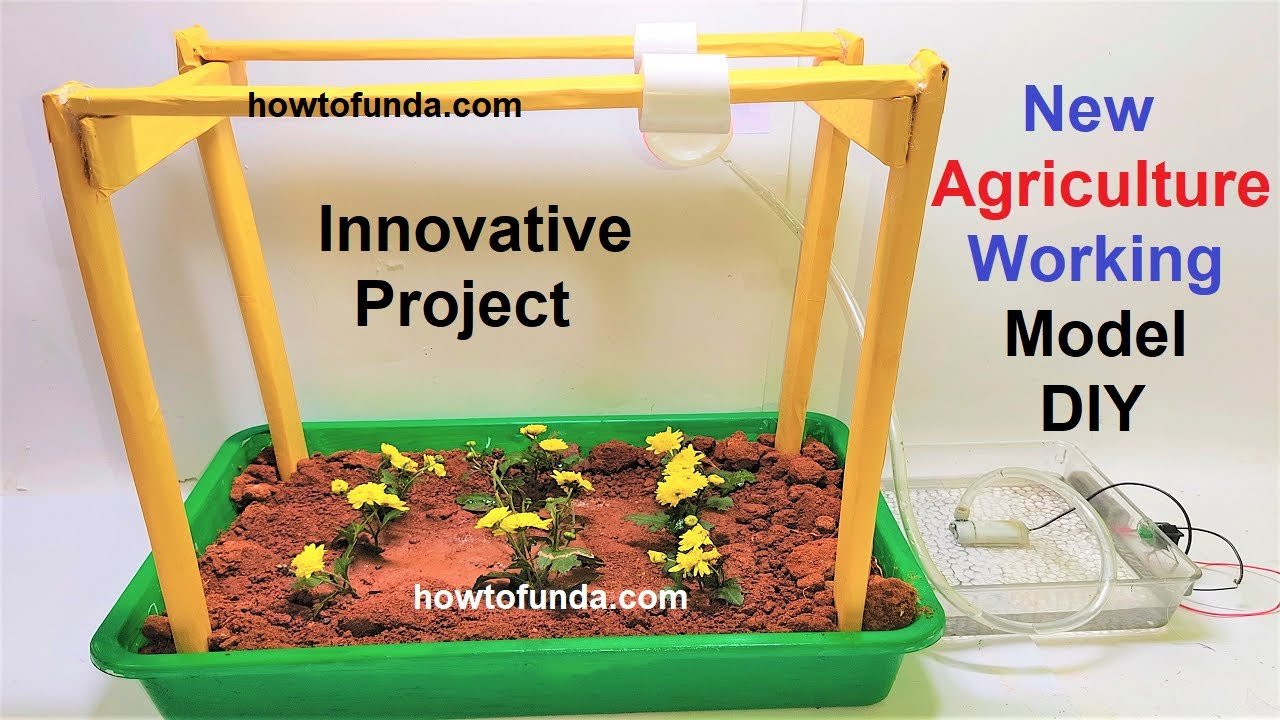
These 100 projects cover a wide range of agricultural challenges and offer solutions to enhance productivity, sustainability, and efficiency these projects very much suitable for inspire awards
Soil and Crop Management:
Testing the effectiveness of organic vs. synthetic fertilizers on crop yield.
Developing a natural pesticide from plant extracts for pest control.
Evaluating the impact of cover crops on soil erosion prevention.
Investigating the benefits of crop rotation for soil health.
Designing a low-cost soil moisture sensor for irrigation optimization.
Developing a smart irrigation system based on weather data and soil moisture.
Exploring the use of mycorrhizal fungi for enhancing plant nutrient uptake.
Investigating the effects of different mulching materials on water retention.
Developing a soil health assessment kit for farmers.
Designing a solar-powered automated greenhouse system.
Water Management:
Creating a rainwater harvesting and storage system for irrigation.
Developing a low-cost water filtration system for rural areas.
Designing a water-saving drip irrigation system for small-scale farms.
Investigating the potential of drought-tolerant crop varieties.
Developing a water quality testing kit for assessing irrigation water.
Exploring the use of aquaponics for integrated fish and plant cultivation.
Designing a water recycling system for greenhouse irrigation.
Developing a real-time water monitoring app for farmers.
Investigating the effects of different irrigation methods on crop yield.
Creating a water-efficient hydroponic farming system.
Pest and Disease Management:
Investigating the impact of beneficial insects on pest control.
Developing a trap crop system for deterring pests from main crops.
Exploring the use of pheromone traps for insect pest management.
Designing a disease prediction model based on climate data.
Investigating the effectiveness of natural repellents for pest control.
Developing a mobile app for pest and disease diagnosis.
Exploring the use of biofungicides for managing fungal diseases.
Designing a smart sensor system for early detection of plant diseases.
Investigating the impact of intercropping on reducing pest pressure.
Creating a biopesticide using beneficial microbes.
Livestock Management:
Developing a wearable health monitor for livestock.
Designing an automated feeding system for poultry.
Investigating the effects of different housing systems on animal welfare.
Exploring the use of probiotics for improving livestock health.
Creating a mobile app for tracking livestock growth and health.
Designing a solar-powered water heating system for livestock.
Investigating the impact of herbal supplements on milk production.
Developing a low-cost fly repellent for livestock.
Exploring the use of vertical farming for animal feed.
Creating a waste management system for efficient livestock manure disposal.
Innovative Technologies:
Designing a drone-based crop monitoring and imaging system.
Developing a smart weather station for real-time climate data collection.
Exploring the use of blockchain technology for transparent food supply chains.
Creating a digital marketplace app for farmers to connect with buyers.
Designing a mobile app for agricultural advisory services.
Developing a solar-powered pest control robot for large fields.
Investigating the use of artificial intelligence in predicting crop diseases.
Exploring the potential of 3D printing for creating customized farming tools.
Designing a crop disease detection tool using image recognition.
Creating an online platform for farmers to share resources and knowledge.
Sustainable Practices:
Investigating the benefits of agroforestry for biodiversity and soil health.
Designing a composting system for converting agricultural waste into fertilizer.
Developing a biofuel production system using agricultural residues.
Exploring the use of biodegradable materials for packaging agricultural products.
Creating a sustainable farming model integrating fish, crops, and livestock.
Investigating the impact of no-till farming on soil carbon sequestration.
Designing a mobile app for promoting sustainable farming practices.
Developing a community-based seed bank for preserving local crop varieties.
Exploring the potential of vertical farming in urban areas.
Creating a system for converting food waste into nutrient-rich compost.
Climate Resilience:
Investigating the effects of climate change on crop phenology.
Designing a heat-tolerant crop variety for warmer climates.
Developing a greenhouse cooling system using renewable energy.
Exploring the use of shade nets for protecting crops from extreme heat.
Creating a model of a climate-resilient sustainable farm.
Investigating the impact of changing rainfall patterns on crop productivity.
Designing a mobile app for climate-smart farming advice.
Developing a system for collecting and storing rainwater for dry periods.
Exploring the use of climate-resistant cover crops for soil protection.
Creating a disaster preparedness plan for extreme weather events.
Market Access and Economics:
Investigating the impact of direct farmer-to-consumer markets.
Designing a low-cost food processing unit for value addition.
Developing a supply chain optimization model for perishable goods.
Exploring the benefits of cooperative farming for small-scale farmers.
Creating a budgeting app for tracking farm expenses and revenues.
Investigating the potential of agritourism for rural economic development.
Designing a branding and marketing strategy for local agricultural products.
Developing a digital payment system for seamless farm transactions.
Exploring the use of e-commerce platforms for selling agricultural products.
Creating a business plan for a community-supported agriculture (CSA) program.
Nutrition and Food Security:
Investigating the impact of crop diversity on household nutrition.
Designing a community garden for improving local food access.
Developing a low-cost food preservation technique for reducing post-harvest losses.
Exploring the potential of edible insects as a sustainable protein source.
Creating a nutrition education program for schools and communities.
Investigating the benefits of home gardening for supplementing diets.
Designing a school meal program using locally grown ingredients.
Developing a fortified food product to address micronutrient deficiencies.
Exploring the use of hydroponics for growing nutritious greens.
Creating a guide for balanced and diverse dietary habits.

